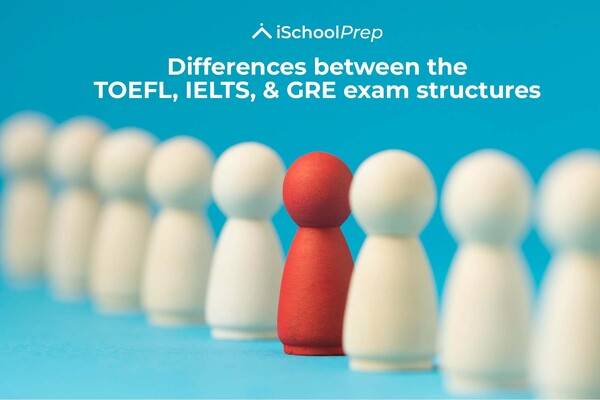Table of Contents
TOEFL, IELTS, & GRE exam structure
Before you start your preparation for any standardized test, you need to have a clear understanding of different exam formats, particularly the TOEFL, IELTS, and GRE exam structure. Each of these tests is uniquely designed to evaluate distinct skill sets, catering to various academic and professional requirements. This article offers a detailed comparison of the TOEFL exam structure, IELTS exam structure, and GRE exam structure, aiming to equip the applicants with the knowledge needed to make informed decisions about their testing choices.
TOEFL exam structure
The Test of English as a Foreign Language (TOEFL) is designed to measure the English language proficiency of non-native speakers. It’s widely accepted by universities and institutions, primarily in the United States.
Key features
- Sections: The TOEFL exam structure comprises four sections – Reading, Listening, Speaking, and Writing.
- Duration: The total test time is about 3 hours.
- Scoring: Each section is scored out of 30, with a total score range of 0-120.
In-depth analysis
- Reading: It consists of 3-4 passages, each followed by 10 questions. It tests comprehension and analysis skills.
- Listening: It includes lectures and conversations in an academic setting, assessing the ability to understand spoken English.
- Speaking: It evaluates the test-taker’s ability to express ideas in English.
- Writing: It involves writing essays that demonstrate the ability to support an argument and write descriptively.
IELTS exam structure

The International English Language Testing System (IELTS) is another prominent English proficiency test, recognized globally, especially in the UK, Australia, and Canada.
Read more: GMAT Score Chart | 5 Tips to Enhance Your Exam Strategy!
Key features
- Versions: IELTS is available in two versions – Academic and General Training.
- Sections: Both versions have four sections – Listening, Reading, Writing, and Speaking.
- Duration: The total test time is around 2 hours and 45 minutes.
In-depth analysis
- Listening: It comprises four recordings, including conversations and monologues.
- Reading Section: The Academic version includes three long texts, while the General Training version features extracts from books, magazines, and newspapers.
- Writing Section: It involves task-based writing for both versions, with differences in tasks between Academic and General Training.
- Speaking Section: It consists of a face-to-face interview, including a short speech and a discussion.
GRE exam structure
The Graduate Record Examinations (GRE) is a standardized test that is an admissions requirement for many graduate schools, particularly in the United States and Canada. Bas on the GRE exam structure, it assesses verbal reasoning, quantitative reasoning, and analytical writing skills.
Key features
- Sections: The GRE exam structure includes Verbal Reasoning, Quantitative Reasoning, and Analytical Writing sections.
- Duration: The total test time was about 3 hours and 45 minutes. However, a shortened GRE exam structure was introduced in September 2023, making the new version of the test approximately 2 hours long.
- Scoring: Scores range from 130 to 170 per section for Verbal and Quantitative Reasoning, and 0 to 6 for Analytical Writing.
In-depth analysis
- Verbal Reasoning: This section of the GRE tests the ability to analyze and draw conclusions from discourse, reason from incomplete data, and understand multiple levels of meaning.
- Quantitative Reasoning: It focuses on understanding, interpreting, and analyzing quantitative information, and solving problems using mathematical models.
- Analytical Writing: It measures the ability to articulate complex ideas clearly and effectively, and support ideas with relevant reasons and examples.
Read more: Conclusive Guide on GRE Fee Structure
Comparing TOEFL, IELTS, & GRE exam structures
| Aspect | TOEFL | IELTS | GRE |
| Purpose | Measures English language proficiency, mainly for academic purposes. | Assesses English proficiency for academic, immigration, or occupational purposes. | Evaluates verbal and quantitative reasoning, analytical writing, and critical thinking for graduate and business school admissions. |
| Test Sections | Reading, Listening, Speaking, Writing | Listening, Reading, Writing, Speaking (Available in Academic and General Training versions) | Verbal Reasoning, Quantitative Reasoning, Analytical Writing |
| Duration | About 3 hours | Around 2 hours and 45 minutes | Approximately 2 hours |
| Scoring | Each section scored out of 30; total score range 0-120 | Band scores from 1 to 9 for each section; overall band score is the average. | Verbal and Quantitative: 130-170 each; Analytical Writing: 0-6 |
| Test Format | Computer-based and paper-based options available | Paper-based test; computer-delivered option available in some locations | Computer-based test |
| Frequency of Test | Multiple times a year | Available on 48 fixed dates a year; up to 4 times a month | Offered year-round at test centers worldwide |
| Result Validity | Scores are valid for 2 years. | Scores are valid for 2 years. | Scores are valid for 5 years. |
| Ideal For | Students applying to universities primarily in the USA | Students and professionals aiming for higher education or immigration to English-speaking countries | Prospective graduate, business, or law school students |
| Preparation Material | Official practice materials, online resources, and books | Official practice tests, books, and online resources | Official guidebooks, practice tests, and online resources |
| Cost | The cost for Indian applicants for 2024 is INR 16,900. | INR 16,250 for both Computer-delivered and Pen and paper based IELTS. | Approximately $220 (subject to change and may vary slightly based on exchange rates). |
Read more: Which is easier GMAT or GRE: A Comprehensive Comparison!
Comparative analysis of TOEFL, IELTS, and GRE
When comparing the TOEFL exam structure, IELTS exam structure, and GRE exam structure, several key differences and similarities emerge:
- Purpose and focus: TOEFL and IELTS primarily assess English language proficiency, while GRE measures general academic readiness, including quantitative and analytical skills.
- Sectional variations: TOEFL and IELTS have similar sections (Reading, Listening, Speaking, and Writing), but the GRE includes unique sections (Verbal Reasoning, Quantitative Reasoning, and Analytical Writing).
- Scoring systems: TOEFL and IELTS scores are based on language proficiency levels, whereas GRE scores reflect a broader range of academic skills.
- Test duration: GRE is slightly shorter than TOEFL and IELTS, but has a broader scope.
Read more: GRE Validity 2025: How long are Your GRE Scores Valid?
Read more: GRE Score Chart: Clear Your GRE with Flying Colors
Key takeaways
- TOEFL focuses on English language proficiency, particularly for academic settings, with a balanced emphasis on reading, listening, speaking, and writing skills.
- IELTS also assesses English language proficiency, available in Academic and General Training versions, catering to different purposes like higher education and immigration.
- GRE exam structure measures a broader range of skills including verbal and quantitative reasoning, and analytical writing, essential for graduate and business school admissions.
- Choose the test based on your specific academic or professional goals. TOEFL and IELTS are ideal for proving English proficiency, while the GRE exam structure is for a more comprehensive academic skill set.
- Each test requires focused preparation, tailored to its unique structure and content.
Begin your study abroad journey with iSchoolPrep. From finding the perfect university to crafting an impressive SOP, we’re here to guide you every step of the way. Contact us now and turn your academic dreams into reality with us!
Liked this article? Read next: Study abroad entrance exams | How to choose the right one?
FAQs
Q1) Which test should I choose for university admissions in the United States?
Answer: For English proficiency, TOEFL is widely accepted in the USA. However, if you’re applying for graduate programs, then GRE might also be required.
Q2) Can I use IELTS scores for immigration purposes?
Answer: Yes, the IELTS General Training version is specifically designed for immigration purposes to English speaking countries like the UK, Australia, Canada, and New Zealand.
Q3) Is the GRE only for students pursuing STEM fields?
Answer: No, given the GRE exam structure, the test is used for admissions to a wide range of graduate programs, including business and law, not just STEM fields.







Thanks for sharing this information.
Are you looking to ace the IELTS exam and achieve your dream score? Look no further than Cambridge English Academy in Delhi. With a team of experienced instructors and a proven track record of success, CEA India is renowned for providing the best IELTS coaching in the city.
Visit us- https://cambridgeenglishacademy.com/best-ielts-coaching-in-delhi/